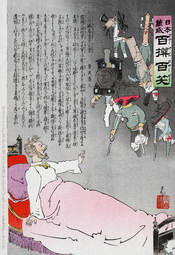The Russo-Japanese War (1904-1905) was the first conflict in this century fought between great powers. Japan seized the planned idea by launching a "bolt from the blue" attack on Russian naval forces in the Far East and landing an army on the Asian mainland. Japan's first gain did not produce a fast end to the problem, which lasted for almost nineteen months. The fighting on land lasted around the desperate blockade of the Russian naval base at Port Arthur and large battles fought in Manchuria. Neither side proved able to win. At sea, however, the Japanese achieved a series of notable successes over the Russian Navy. The Battle of Tsushima in which a Russian fleet was wiped out after steaming 18,000 miles from the Baltic Sea to Northeast Asia which is often considered a classic example of a important fleet engagement. By the spring of 1905, both Japan and Russia were worn out.
The defeats suffered by the Russian armed forces in the Far East forced outbreaks of ground-breaking violence throughout Russia. Meanwhile, Japan was near the end of its financial and manpower reserves. The war weariness of both sides led them to accept the offer to open negotiations made by President Theodore Roosevelt, who won the Nobel Peace Prize for his political efforts. The Russo-Japanese war was important for many reasons ,which included technology that they used during that time which reflected use later on in the world.
The Russo-Japanese War is important for several reasons. First, it was fought in Northeast Asia, which has been and remains an important arena of problems. As such it may give a useful starting point for thinking about probable regional problems in the future. Second, Japan's successful behavior of this limited war can be usefully compared and contrasted with Prussia's manner of...


